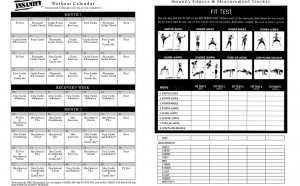
Gym Weights Workout plan
For anyone looking to pack on some serious muscle mass, one of the top priorities will be to determine what the best bodybuilding workout to follow is. There are a wide range of different workouts available, so choosing the one that will suit your needs best is important.
It's also essential that you understand which factors contribute the most to gaining lean muscle mass. A program that utilizes these principles will often fare better than one that doesn't.
Let's take a brief look at some of the more popular bodybuilding workout set-ups and identify the pros and cons of each.
The 5 X 5 Program
The five-by-five program is one that is quite popular among those who are looking to gain a high amount of strength and muscle mass.
The set-up of this program is to perform three main exercises that target the main muscle groups in the body (both lower and upper body in the same workout), performing five sets of five repetitions. At the end of each workout you can add in a few sets of isolated exercises if you like, but it's not required by the program.
Pros
One of the biggest advantages of this set-up is going to be an increased frequency of training. Since you will stimulate so many muscle fibers every other day, you will see a very high release of testosterone, promoting a good degree of muscle mass growth.
Most individuals also find that they become hungrier while following this program, which is representative of the intense nature of it.
Cons
The second con to this set-up is due to the fact that you'll be lifting heavy three times a week - it doesn't lend so well for a lot of other activity, such as heavy sports training. If you're involved in high-level athletics, it may be better to choose a slightly less demanding program so you don't become overly fatigued.
Sample Workout
You'll want to aim to perform the 5 X 5 protocol for the core exercises as described above and then cut back on the volume for the accessory lifts.
If you know going in you're someone who tends to have difficulty recovering, then you may want to attempt a 3 X 5 set-up first and see how you do. It can be easy to overtrain on this program if you're not careful.
Alternate between workout A and workout B three times a week with at least one day off between sessions. Aim to rest for 60-to-120 seconds between sets of the core exercises and 30-to-45 seconds between sets for the accessory exercises.
German Volume Training
The next higher volume muscle-building program is German Volume Training. This one is quite similar to the 5 x 5 program in that it too is going to call for a higher set number, but it differs in that it takes the rep ranges much higher to ten reps for each set.
The design of this program is to focus on two main muscle groups per day, alternating between them over the course of three days a week.
For someone who has some training behind them, this type of workout can allow you to build muscle mass at an incredibly high pace provided you're following a proper nutritional protocol with it as well.
Some individuals will make the mistake of not looking after their nutrition on this program and it's those people who are at a much higher risk of burning out after a short period of time passes.
Similar to the 5 x 5, if you're planning on doing a lot of additional activity with this program - sports training, cardio, or otherwise, you may run into some problems. Typically you will need to reduce everything else you're doing so the body can have enough time to recover and progress ... be sure you factor this in as well.
The other con of this program is that if you are interested in maximum strength development, it may not be the absolute best idea either. The reason for this is that pure strength gains typically require you to lift in a lower rep range, while this program pushes it a bit further.
There are advanced variations with German Volume Training that bring the rep range lower to allow for more weight. If this is an important issue for you, think about looking into that.
For this workout protocol, you are to select one compound exercise for each muscle group and hit it hard with ten sets of ten reps. Once those have been completed, then you can add a few isolation exercises if you wish but bring them down to only 2-3 sets of 10-15 reps.
Aim to keep up the pace of the workout by keeping your rest to 60-90 seconds. Remember that since you are shooting for the higher rep range of 10 reps, you will not be using as high of a weight as you would on a 5-6 rep protocol, so be sure you adjust your load accordingly. 50-60% of your 1 rep max would be a good place to start.
The workout is broken up into three different days: chest and back, legs and abs, and then shoulders and arms. Take one day off between workouts and have the full weekend for solid recuperation.
The FST-7 Training Program
The third type of volume training program that's catching on rather rapidly is the FST-7 Training Program. This training program doesn't specifically lay out all the exercises you need to perform in a given session nor does it specifically state that you must divide the body up into a certain protocol (upper body and lower body or chest/back, legs and shoulder for example), but rather gives you guidelines as to what you should be doing on the last exercise for each body part worked that session.
The FST-7 name stands for Fascial Stretch Training, which indicates that one of the primary objectives this program attempts to achieve is to stretch the fascia tissue, which is the soft connective tissue that is found surrounding your muscles as well as throughout the rest of the body.
It is primarily responsible for helping to maintain the structural integrity of the body, provide support and protection, as well as work as a shock absorber when you perform activity throughout the day, both in the gym and out.
When this tissue is stretched you will see increases in muscle growth. There will be a higher deliverance of minerals, amino acids and oxygen to the tissues.
With this set-up, perform seven sets of 15 reps for the last exercise you do for each muscle group. It's important to keep your rest periods between these sets shorter - right around 30 seconds total.
Note: it will be common to adjust the weight downward from what you'd normally use for this particular exercise due to the fact that you are using a much higher total number of sets and the longer rep range will demand that you're not lifting as heavy.
If you want to specialize in certain body parts you can definitely do so or if you prefer to keep the rest of the program lower in total volume because you don't have the best of recovery rate, you can certainly do that as well.
Another pro to this approach is that the higher rep and set range for that one exercise will stimulate the metabolic rate considerably, so whether your goal is muscle building or fat loss, provided you're eating the correct accompanying diet, you can see a boost in results through that manner as well.
Potentially the one con you may see with this approach is, if you struggle with recovery, you may not be able to work out as frequently as you're accustomed after performing this protocol. After time you will likely find that your body adapts, so try not to abandon the program too quickly if this is in fact what you find.
INTERESTING VIDEO



Share this Post
Related posts
Home gym Workout plan
The At Home Workout incorporates these two together for a high calorie consumption (for losing that little gut), and for…
Read MoreDaily gym Workout plan for Men
Using their years of experience in the fitness industry competing, modeling, training clients, and helping change thousands…
Read More









